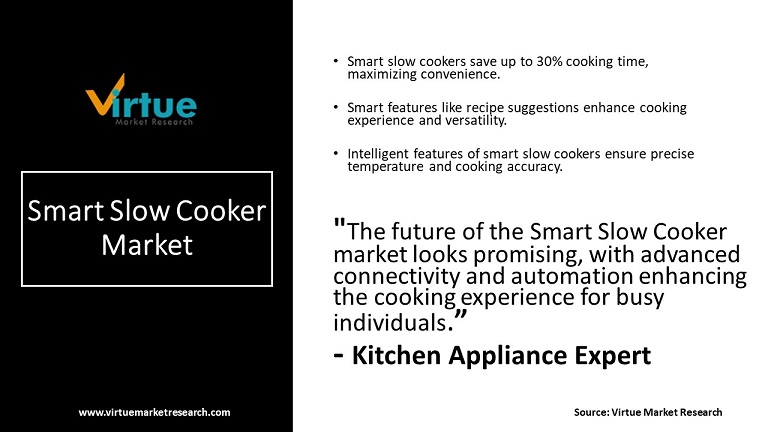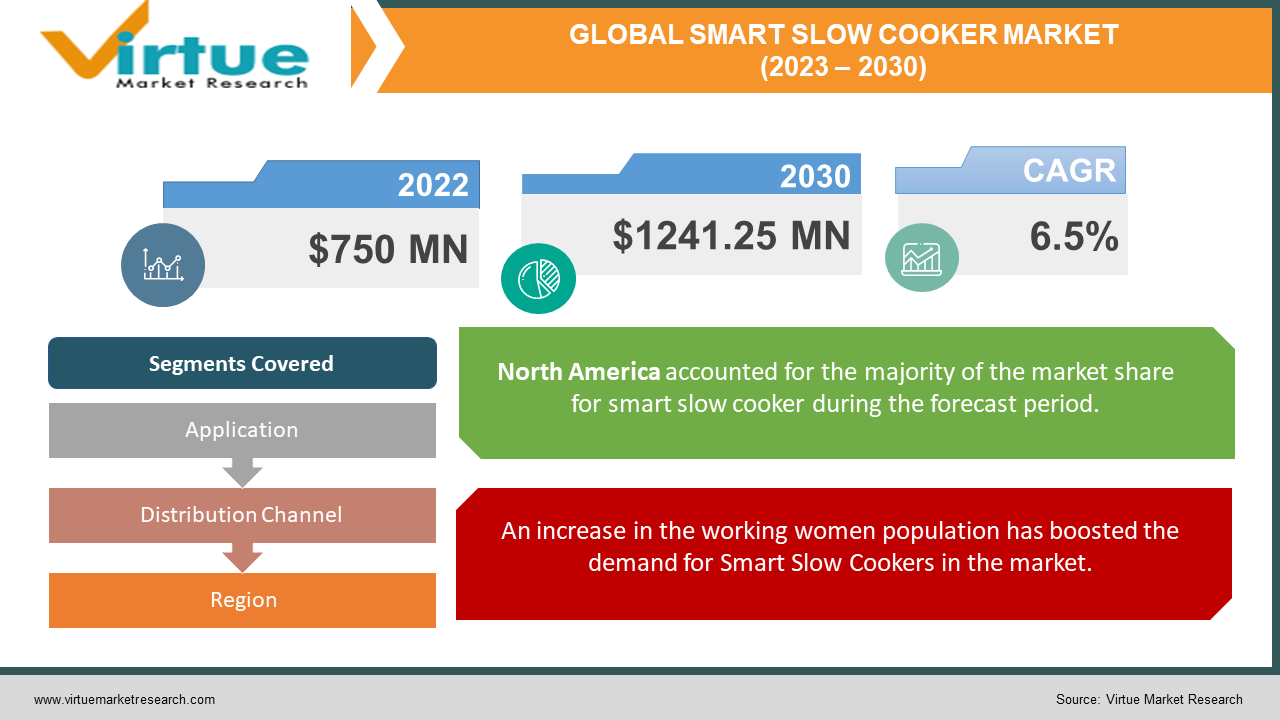Smart Slow Cooker Market Size (2023 - 2030)
The Global Smart Slow Cooker Market was estimated to be worth USD 750 Million in 2022 and is anticipated to reach a value of USD 1241.25 Million by 2030, growing at a fast CAGR of 6.5% during the outlook period 2023-2030.
A slow cooker is a cooking appliance that takes more time to prepare food than conventional cookers. The advancement in technology led to the development in the cooking industry as well, which resulted in smart slow cookers. A smart slow cooker allows users to control the cooking time and temperature through a smartphone application. A person can connect to a smart slow cooker through Wi-Fi or internet connectivity and cook without hassles. The smart slow cooker consists of a heating element, temperature sensor, power and control board, connectivity module, and a control panel. The temperature sensor and connectivity module are what make the appliance different from conventional cookers. The temperature sensor allows users to set the cooking temperature value through remote connectivity and the connectivity module enables them to set the cooking temperature and control cooking duration through the internet. A user can start using the smart slow cooker by registering themselves on the manufacturer’s website and then connecting the smartphone to the smart cooker’s control panel. The smart gadget has enabled consumers to save cooking time and prepare healthy and delicious meals. Further, due to its slow cooking and remote connectivity benefit it conserves energy and facilitates hands-off cooking, which is ideal for people working long hours in a hectic schedule.
Global Smart Slow Cooker Market Drivers:
An increase in the working women population has boosted the demand for Smart Slow Cookers in the market.
With time, the traditional role of women in a household such as cooking and taking care of family is replaced as women have started working. Therefore, there is an increase in demand for smart slow cookers in the market. The smart slow cooker enables the user to just set the food for cooking and allows remote monitoring, preventing overcooking, temperature control, and others with a single click on the smartphone. Working women can monitor cooking through smartphone applications and set the food ready at dinner time. Further, it allows them to provide healthy food to their family as smart slow cookers cook food meticulously such as tenderizing and marinating meat properly. Moreover, one-pot meals, soups, meat, and others can be easily prepared with the help of a smart slow cooker. Further, smart slow cookers are energy-efficient as they consume less energy during cooking compared to other kitchen appliances.
Technological advancements have fuelled the demand for Smart Slow Cookers in the market.
Technology has altered everything around the world and its entry into the kitchen appliance industry has changed the structure of cooking. The smart slow cooker has showcased a trend of tech-integrated cooking. As working schedules became hectic, consumers shifted their demand toward time-saving and smart cooking options. Trends such as Wi-Fi-enabled smart slow cookers for energy-efficient cooking and remote monitoring, and portable smart slow cookers with removable crock and low-weight features that allow users to carry them easily. Moreover, companies are introducing cookers with alert alarms that prevent over-cooking and absent-minded cooking, additionally, structural developments such as digital locking mechanisms and seals that prevent spill-free cooking are in great demand by consumers. For example, CHEF iQ’s 6-quart capacity Smart Slow Cooker, which has a black aluminium finish, pressure release valve with twist and button release, a steaming rack and basket, comes with locking brackets, and a large LCD for efficient cooking. Furthermore, AI and voice-assistant smart slow cookers are becoming popular among consumers.

Global Smart Slow Cooker Market Challenges:
A smart slow cooker though smart exhibits many features of the slow cooker. For instance, a slow cooker is usually slow in cooking and it is not ideal for every recipe as only meat, vegetable chunks, salmon, pulses, and soups can be cooked easily. Further, users need special attention while cutting vegetable chunks as they can deform their shape once set for cooking. Additionally, mistakes while preparing a meal cannot be rectified because of the cooking hours. All of this can hinder the market growth for smart slow cookers.
Further, electricity and connectivity downtime such as internet connectivity and Wi-Fi downtime can affect the meal quality and taste, which can further decline the market demand for smart slow cookers. Therefore, all these restraints must be eliminated to decline the challenges to Smart Slow Cooker Market.
Global Smart Slow Cooker Market Opportunities:
The Global Smart Slow Cooker Market is anticipated to deliver lucrative opportunities for businesses, which include acquisitions, partnerships, collaborations, and agreements during the forecasted period. Furthermore, technological advancements and an increase in smartphone usage by consumers are predicted to develop the market for the smart slow cooker and enhance its future growth opportunities.
COVID-19 Impact on Global Smart Slow Cooker Market:
The pandemic has had a positive impact on the smart slow cooker market. Due to the lockdown, most people spent time at home, which led to an increase in the consumption of food and hence cooking activities. Hence, there was a rise in demand for smart slow cookers. Smart slow cookers consume less energy and conserve the use of fossil fuels for cooking as it works through the internet, boosting their demand as a green-tech-enabled solution for cooking. Further, the market for smart slow cookers witnessed an increase in sales from online platforms during the lockdown.
Global Smart Slow Cooker Market Recent Developments:
In November 2020, CHEF iQ, a leading company in smart kitchen appliances launched new features in its smart cooking application. It included dark-theme and ingredient-first calculator features in its smart cooker. The dark-theme feature enables optimal visual comfort and the ingredient-first calculator help to solve ingredient and cooking method problems.
SMART SLOW COOKER MARKET REPORT COVERAGE:
|
REPORT METRIC |
DETAILS |
|
Market Size Available |
2022 - 2030 |
|
Base Year |
2022 |
|
Forecast Period |
2023 - 2030 |
|
CAGR |
5.5% |
|
Segments Covered |
By Application, Distribution Channel, and Region |
|
Various Analyses Covered |
Global, Regional & Country Level Analysis, Segment-Level Analysis, DROC, PESTLE Analysis, Porter’s Five Forces Analysis, Competitive Landscape, Analyst Overview on Investment Opportunities |
|
Regional Scope |
North America, Europe, APAC, Latin America, Middle East & Africa |
|
Key Companies Profiled |
Hamilton, CHEF iQ, Instant Brands, Crockpot, Calphalon, Cuisinart, Belkin, Conair |
Global Smart Slow Cooker Market Segmentation: By Application
-
Household
-
Commercial
Based on market segmentation by application, household occupies the highest share of the market. Smart slow cookers are increasingly in demand by households for clean and healthy food consumption. Emerging features in smart slow cookers such as Wi-Fi and Bluetooth connectivity, AI monitoring and voice assistant, digital recipes that are installed in the application, and others have increased its demand in the household sector. Further, a growing demand for 6-quart smart slow cookers is witnessed in large families as it enables cooking different meals in large amounts. The commercial sector is growing faster during the forecast period as smart slow cookers are widely used by catering services, restaurants, and hotels to cater to large consumer demand at once. Further, large-sized smart cookers with various cooking modes are becoming popular among restaurants.
Global Smart Slow Cooker Market Segmentation: By Distribution Channel
-
Online
-
Hypermarket/Supermarket
-
Retail Stores
-
Others
Based on segmentation by distribution channel, hypermarket, and supermarket occupies the highest share in the market. The consumer mind set of touch and feel a product has increased the sale of smart slow cookers via supermarkets and hypermarkets. Furthermore, attractive offers such as cashback, sales, discounts, free goodies such as kitchen accessories, and free recipe books have further boosted the demand for smart slow cookers via hypermarkets and supermarkets. The online segment is witnessing significant growth in the smart slow cooker market. Product and price comparison, easy home delivery, and 24*7 accessibility through online apps have increased the demand for smart slow cookers via the online segment.
Global Smart Slow Cooker Market Segmentation: By Region
-
North America
-
Europe
-
Asia Pacific
-
Middle East and Africa
-
South America
North America occupies the highest market share, region-wise. Owing to technology advancements such as AI and voice enable smart slow cookers and all-at-one-stop features such as 9-in-1 smart slow cookers with warmer, steamers, and other features, have increased the demand for smart slow cookers in the region. Further, rising meat consumption among the US population has boosted the demand for smart slow cookers. This is because meat and other ingredients are cooked more safely and bacteria are easily killed by steam in a smart slow cooker, which provides a healthy and clean meal.
Asia Pacific witnessed faster growth during the forecast period. The rising population and foodie nature of people in this region has boosted the demand for smart slow cookers in the region. Further, changing cooking preferences as a result of Western influence has increased the use of smart and wi-fi-enabled slow cookers in the region.
Global Smart Slow Cooker Market Key Players:
-
Hamilton
-
CHEF iQ
-
Instant Brands
-
Crockpot
-
Calphalon
-
Cuisinart
-
Belkin
-
Conair
Chapter 1. Smart Slow Cooker Market – Scope & Methodology
1.1. Market Segmentation
1.2. Assumptions
1.3. Research Methodology
1.4. Primary Sources
1.5. Secondary Sources
Chapter 2. Smart Slow Cooker Market – Executive Summary
2.1. Market Size & Forecast – (2023 – 2030) ($M/$Bn)
2.2. Key Trends & Insights
2.3. COVID-19 Impact Analysis
2.3.1. Impact during 2023 - 2030
2.3.2. Impact on Supply – Demand
Chapter 3. Smart Slow Cooker Market – Competition Scenario
3.1. Market Share Analysis
3.2. Product Benchmarking
3.3. Competitive Strategy & Development Scenario
3.4. Competitive Pricing Analysis
3.5. Supplier - Distributor Analysis
Chapter 4. Smart Slow Cooker Market - Entry Scenario
4.1. Case Studies – Start-up/Thriving Companies
4.2. Regulatory Scenario - By Region
4.3 Customer Analysis
4.4. Porter's Five Force Model
4.4.1. Bargaining Power of Suppliers
4.4.2. Bargaining Powers of Customers
4.4.3. Threat of New Entrants
4.4.4. Rivalry among Existing Players
4.4.5. Threat of Substitutes
Chapter 5. Smart Slow Cooker Market - Landscape
5.1. Value Chain Analysis – Key Stakeholders Impact Analysis
5.2. Market Drivers
5.3. Market Restraints/Challenges
5.4. Market Opportunities
Chapter 6. Smart Slow Cooker Market - By Application
6.1 Household
6.2 Commercial
Chapter 7. Smart Slow Cooker Market - By Distribution Channel
7.1 Online
7.2 Hypermarket/Supermarket
7.3 Retail Stores
7.4 Others
Chapter 8. Smart Slow Cooker Market - By Region
8.1 North America
8.2 Europe
8.3 Asia-Pacific
8.4 Rest of the World
Chapter 9. Smart Slow Cooker Market - Key Players
9.1 Hamilton
9.2 CHEF iQ
9.3 Instant Brands
9.4 Crockpot
9.5 Calphalon
9.6 Cuisinart
9.7 Belkin
9.8 Conair
Download Sample
Choose License Type
2500
4250
5250
6900
Frequently Asked Questions
The Global Smart Slow Cooker Market was estimated to be worth USD 48.7 Million in 2022.
Increase in the working women population and technological advancements are the market drivers of the global Smart Slow Cooker market.
Hypermarkets and Supermarkets, Retail Stores, Online, and others are the segments of the Global Smart Slow Cooker Market by distribution channel.
Hypermarkets and Supermarkets, Retail Stores, Online, and others are the segments of the Global Smart Slow Cooker Market by distribution channel.
North America is dominating the Global Smart Slow Cooker Market.
Asia-Pacific is the fastest-growing region in Global Smart Slow Cooker Market.




